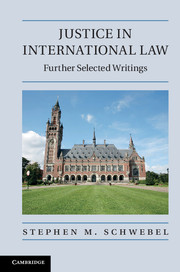Book contents
- Frontmatter
- Contents
- PART I International Court of Justice
- PART II International arbitration
- 12 A BIT about ICSID
- 13 The influence of bilateral investment treaties on customary international law
- 14 The United States 2004 Model Bilateral Investment Treaty: an exercise in the regressive development of international law
- 15 The United States 2004 Model Bilateral Investment Treaty and denial of justice in international law
- 16 Anti-suit injunctions in international arbitration: an overview
- 17 The law applicable in international arbitration: application of public international law
- 18 The validity of an arbitral award rendered by a truncated tribunal
- 19 The authority of a truncated tribunal
- 20 Injunction of arbitral proceedings and truncation of the tribunal
- 21 Public policy and arbitral procedure
- 22 The creation and operation of an International Court of Arbitral Awards
- 23 The Kingdom of Saudi Arabia and Aramco arbitrate the Onassis Agreement
- 24 The Southern Bluefin Tuna case
- 25 A celebration of the United Nations New York Convention on the Recognition and Enforcement of Foreign Arbitral Awards
- 26 Does the consent of the Contracting Parties govern the requirement of an “investment” as specified in Article 25 of the ICSID Convention?
- PART III Miscellaneous
- Collected publications, judicial opinions and book reviews
- Index
15 - The United States 2004 Model Bilateral Investment Treaty and denial of justice in international law
from PART II - International arbitration
Published online by Cambridge University Press: 07 September 2011
- Frontmatter
- Contents
- PART I International Court of Justice
- PART II International arbitration
- 12 A BIT about ICSID
- 13 The influence of bilateral investment treaties on customary international law
- 14 The United States 2004 Model Bilateral Investment Treaty: an exercise in the regressive development of international law
- 15 The United States 2004 Model Bilateral Investment Treaty and denial of justice in international law
- 16 Anti-suit injunctions in international arbitration: an overview
- 17 The law applicable in international arbitration: application of public international law
- 18 The validity of an arbitral award rendered by a truncated tribunal
- 19 The authority of a truncated tribunal
- 20 Injunction of arbitral proceedings and truncation of the tribunal
- 21 Public policy and arbitral procedure
- 22 The creation and operation of an International Court of Arbitral Awards
- 23 The Kingdom of Saudi Arabia and Aramco arbitrate the Onassis Agreement
- 24 The Southern Bluefin Tuna case
- 25 A celebration of the United Nations New York Convention on the Recognition and Enforcement of Foreign Arbitral Awards
- 26 Does the consent of the Contracting Parties govern the requirement of an “investment” as specified in Article 25 of the ICSID Convention?
- PART III Miscellaneous
- Collected publications, judicial opinions and book reviews
- Index
Summary
In 2004, the United States government adopted and published a Model Bilateral Investment Treaty that substantially revised the Model Bilateral Investment Treaty previously employed by it in negotiations with other governments over the conclusion of bilateral investment agreements. It has subsequently used the 2004 Model BIT in negotiating bilateral investment treaties, and investment chapters of free trade agreements, with other governments.
In the view of the author, the conception and publication of the 2004 Model was an exercise in the regressive development of international law. It was so contended in some detail in a contribution to Global Reflections on International Law, Commerce and Dispute Resolution: Liber Amicorum in Honour of Robert Briner (2005).
The present chapter is in honor of another major figure in the world of international arbitration, particularly that of international investment law, and more particularly still, that of the International Centre for Settlement of Investment Disputes (ICSID), of which Professor Christoph Schreuer is the leading authority. It does not revisit the extensive terms of the 2004 Model BIT but rather concerns a single provision of it that the author did not address in the Briner essay.
The 2004 Model Bilateral Investment Treaty provides in Article 5, “Minimum Standard of Treatment” that:
Each Party shall accord to covered investments treatment in accordance with customary international law, including fair and equitable treatment and full protection and security.
[…]
- Type
- Chapter
- Information
- Justice in International LawFurther Selected Writings, pp. 161 - 164Publisher: Cambridge University PressPrint publication year: 2011
- 1
- Cited by



